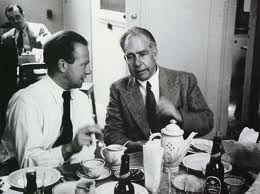The historical and scientific implications of the play Copenhagen have been debated. Many historians have weighed in since the production first opened on how they view the accuracy of the characters’ statements and the motivations that Frayn has given them (both researched and imagined). Frayn himself issued a postscript after the London production, addressing some scientific and historical points, as well as a post-postscript after the New York production.
Did Heisenberg keep the German nuclear program from achieving an atomic bomb, either subconsciously or consciously? Was this his form of resistance, or was it a spin he came up with after the war to improve his image? How could Heisenberg stay in Germany when so many of his colleagues were forced to flee? If he had made different choices, at any number of points along the way, how might history have been different?
For more context:
- Keith Huxen, Senior Director of Research and History at the National World War II Museum, gives an overview of the background and potential interpretations of the 1941 meeting.
- The American Institute of Physics provides a summary with links to an excerpt from the Farm Hall transcripts, recorded after the dropping of the atomic bomb on Hiroshima.
- Frederick Seitz of the American Physical Society responds to the release in 2002 of letters Bohr drafted but never sent to Heisenberg in the early 1960s, taking issue with statements Heisenberg made to Robert Jungk as the author worked on Brighter than a Thousand Suns.
- From the Atomic Heritage Foundation, a description of the timeline over which Nazi Germany drove out most of its most talented physicists, because they were Jews.
Ultimately, the play is a work of art bringing to life historic figures whom we can no longer ask for their thoughts, even if they could collect them. As the historical record suggests, being able to remember even what they said to one another on this one occasion was an insurmountable challenge. The struggle of two old friends to stay friends amid the most extreme circumstances makes for a poignant theatrical journey.
Join us for a discussion of the historical and ethical implications of the Copenhagen meeting after our Dec. 4 matinee, led by Georgetown University professor and historian of science Kathryn Olesko.
